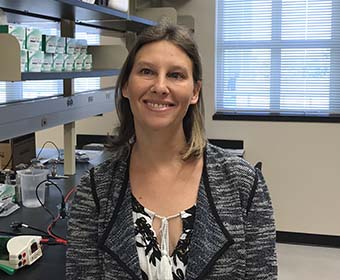
AUGUST 24, 2021 — An unpleasant side effect of chemotherapy could one day be eliminated through research being conducted at UTSA. Lindsey Macpherson, assistant professor of neuroscience and developmental and regenerative biology, recently received a three-year, $450,000 Voelcker Fund Young Investigator Award from the Max and Minnie Tomerlin Voelcker Fund to pursue novel research in this area. Macpherson is an expert in researching the sense of taste and the molecules, cells and circuits involved in chemosensation, from the tongue and gut to the brain.
“When I conduct talks about taste research, I always get people coming up to tell me how themselves or a friend went through chemotherapy treatment and completely lost their sense of taste, along with how long it took to recover,” Macpherson said. “That resonated with me and was something I was interested in following up on.”
The Voelcker Fund Young Investigator Award makes it possible for Macpherson and her team of student researchers to better understand why taste is often lost during chemotherapy. The focus will be on how taste neurons and the taste receptor cells come back together. The team will examine how the neuron and receptor cell connections can be disrupted during the process of chemotherapy, how it might return to normal, and who may be more susceptible for prolonged taste loss.
“One of the most stressful parts of most chemotherapy is the nausea and things like that, but a close second is loss of taste,” Macpherson said. “Once chemotherapy patients begin to recover from a round of treatment, being able to eat and keep up their nutrition is very important and helps add to quality of life.”
In Macpherson’s UTSA laboratory, her team will give mice a course of chemotherapy and monitor their taste function over time. They’ll study the behavioral abilities of the mice to detect different tastes and different thresholds.
They’ll also examine neurons and how they respond to different taste qualities over time. It’s at this phase that Macpherson will test a novel approach she helped developed called GRASP, which stands for GFP Reconstitution Across Synaptic Partners. GRASP produces a fluorescent label at taste synapses which can be monitored over time using advanced microscopes to visualize how these neurons react during chemotherapy.
“This new technique is one of the most novel aspects about our research at UTSA that will lay the groundwork of understanding how chemotherapy affects taste connectivity and function,” Macpherson said. “This is still a basic level of research but by understanding what goes wrong, we want to improve diagnosis on how to best prevent or repair these taste connections in the future.”
After this phase of the research is complete, Macpherson will explore taking the research from mice to humans. By potentially partnering with a dental school, biopsies from patients undergoing chemotherapy could be used to help translate what her team learned from the mouse models to a human system.
The UTSA Brain Health Consortium has assembled a world-class research enterprise, comprised of nearly 40 of the nation’s leading brain health researchers, dedicated to conquering the greatest mysteries of the brain.
The researchers are leveraging their expertise in neurodegenerative disease, brain circuits and electrical signaling, traumatic brain injury, regenerative medicine, stem cell therapies, medicinal chemistry, neuroinflammation, drug design and psychology to collaborate on complex, large-scale research projects that will produce a greater understanding of the brain’s complexity and the factors that cause its decline.
UTSA Today is produced by University Communications and Marketing, the official news source of The University of Texas at San Antonio. Send your feedback to news@utsa.edu. Keep up-to-date on UTSA news by visiting UTSA Today. Connect with UTSA online at Facebook, Twitter, Youtube and Instagram.
Move In To COLFA is strongly recommended for new students in COLFA. It gives you the chance to learn about the Student Success Center, campus resources and meet new friends!
Academic Classroom: Lecture Hall (MH 2.01.10,) McKinney Humanities BldgWe invite you to join us for Birds Up! Downtown, an exciting welcome back event designed to connect students with the different departments at the Downtown Campus. Students will have the opportunity to learn about some of the departments on campus, gain access to different resources, and collect some giveaways!
Bill Miller PlazaCome and celebrate this year's homecoming at the Downtown Campus with food, games, giveaways, music, and more. We look forward to seeing your Roadrunner Spirit!
Bill Miller PlazaThe University of Texas at San Antonio is dedicated to the advancement of knowledge through research and discovery, teaching and learning, community engagement and public service. As an institution of access and excellence, UTSA embraces multicultural traditions and serves as a center for intellectual and creative resources as well as a catalyst for socioeconomic development and the commercialization of intellectual property - for Texas, the nation and the world.
To be a premier public research university, providing access to educational excellence and preparing citizen leaders for the global environment.
We encourage an environment of dialogue and discovery, where integrity, excellence, respect, collaboration and innovation are fostered.